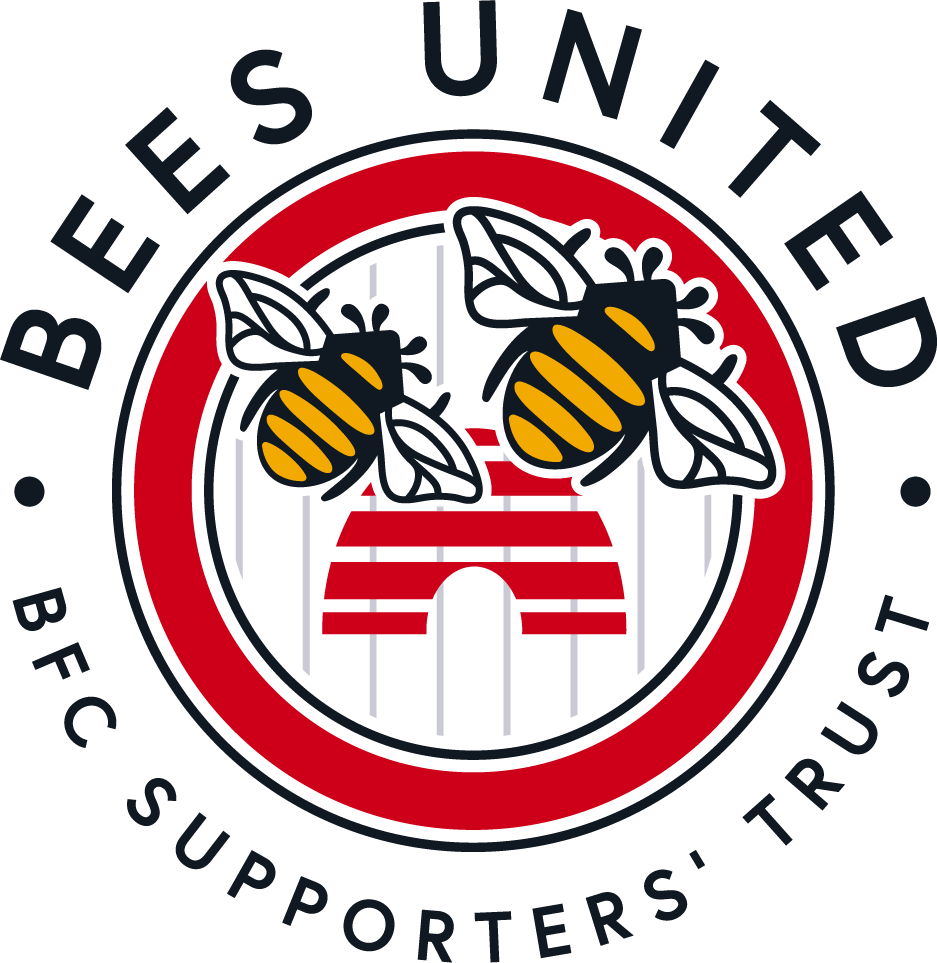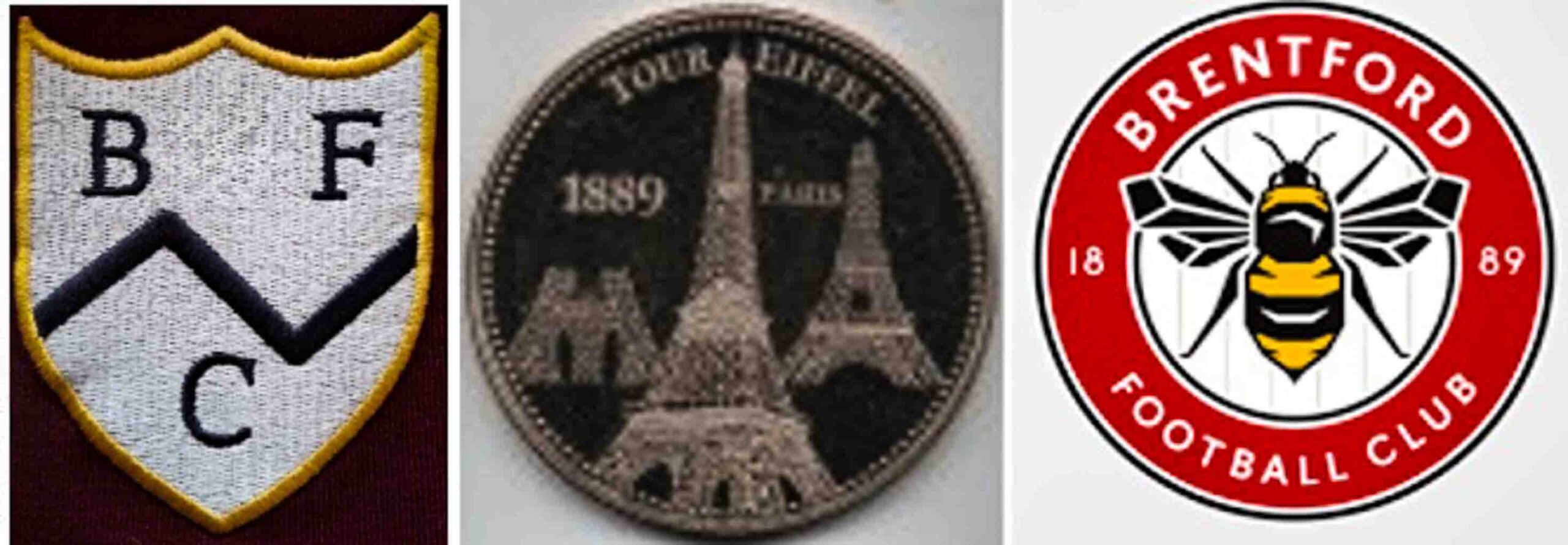The modern Olympics were first held in Athens in 1896, just 7 years after Brentford FC was founded, but there have been quite a few connections to the Bees over the ensuing years.
1908 London
Although Griffin Park was only 5 years old back in 1909, attendances were falling as results on the pitch were poor. The directors looking to revive the club fortunes gave serious consideration to moving the White City Stadium. The venue had been built for the first London Olympic games a year earlier, but then had laid empty. The idea turned out to be nothing but a pipe dream as the finances to make the move just didn’t stack up at that time.
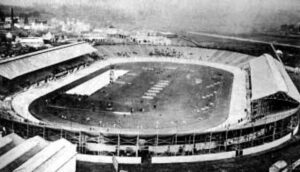 Another potential move to White City was considered again in 1913 (although probably a blessing it didn’t progress given WWI was looming on the horizon). Then again in 1935 and 1937 as Griffin Park matchday crowds pushed towards its limit of 40,000, with the White City’s capacity comfortably able to hold such attendances. In the 1930’s, of course, Brentford were in the Top Tier, whilst the other team already located in London, W12 were in the 3rd Division.
Another potential move to White City was considered again in 1913 (although probably a blessing it didn’t progress given WWI was looming on the horizon). Then again in 1935 and 1937 as Griffin Park matchday crowds pushed towards its limit of 40,000, with the White City’s capacity comfortably able to hold such attendances. In the 1930’s, of course, Brentford were in the Top Tier, whilst the other team already located in London, W12 were in the 3rd Division.
A final White City move again cropped up in discussions during 1968, as part of the aftermath of the potential QPR takeover a year earlier.
The stadium was demolished in 1984 having never really been fully utilised.
1948 London
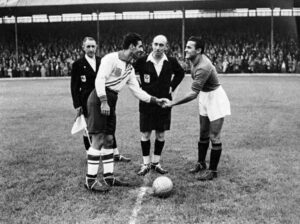 When London hosted the Olympics for a second time in 1948, Griffin Park went into Olympic history as one of the venues.
When London hosted the Olympics for a second time in 1948, Griffin Park went into Olympic history as one of the venues.
It hosted an Olympic preliminary football match between Italy and the United States
The 20,000 crowd (just down on Brentford’s average that season) saw a one-sided affair as Italy scored 9 (nine) without reply.
Although it wasn’t a record-breaking score for that Olympics as Sweden netted 12 against South Korea but one of the US players unfortunately dislocated his collarbone during the match. Apart from Griffin Park, the other venues used during the games were Wembley and the club stadia of Arsenal, Brighton, Crystal Palace, Fulham, Portsmouth and Tottenham.
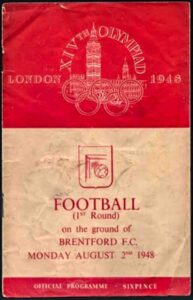
The grounds of non-league sides Dulwich Hamlet, Ilford, and Walthamstow Avenue were also used.
Football has been an Olympic event since 1900, apart from at Los Angeles in 1932.
It was omitted at the LA games as the football authorities had held their inaugural World Cup competition in Uruguay two years earlier.
1952 Helsinki
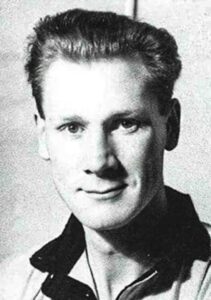 Four years later it was turn of a Brentford player to have an Olympic connection, with the appearance of Bee Bill Slater in the GB football team at the Helsinki games.
Four years later it was turn of a Brentford player to have an Olympic connection, with the appearance of Bee Bill Slater in the GB football team at the Helsinki games.
He played in the preliminary round match with Luxembourg, which GB lost 5-3 (aet) although he did score GB’s second goal, as they exited the competition.
Although he only played 7 games for the Bees in that era, he went onto to win the League three times with Wolves before returning to Griffin Park in 1963 for a further 5 games.
This second spell included playing in the club’s record victory, 9-0, against Wrexham at Griffin Park.
In later life he continued the Olympic theme by joined the National Olympic Committee, and his daughter, Barbara, also represented GB, in gymnastics at the 1976 Montreal games.
There is another a very tenuous Brentford link to a Great Britain Bronze Medal at the 1952 games. This relates to 100m sprinter, McDonald Bailey, who had competed at the previous games in 1948, coming 6th in the final.
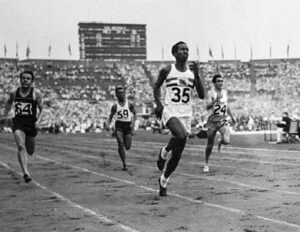 In November 1950, the facilities at Griffin Park were placed at his disposal to help him prepare for the Centennial games in Christchurch, New Zealand, the following month.
In November 1950, the facilities at Griffin Park were placed at his disposal to help him prepare for the Centennial games in Christchurch, New Zealand, the following month.
In return, he coached Brentford’s players on the use of pace in short sprints and to be quicker off the mark.
He was certainly an expert, as he jointly held the 100-meter world record of 10.2 seconds between 1951 and 1956.
He went on to win Olympic Bronze in 1952 (number 35 in picture), and just maybe, the Griffin Park “facilities” had helped him on his way!
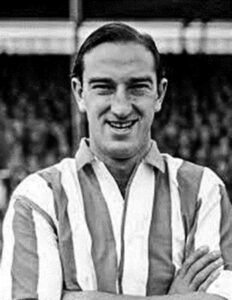
1956 Melbourne
Four years later the games were held in November/December to coincide with the Australian summer.
Another Bee, centre half Terry Robinson, who had appeared for the England Amateur side, was included in the GB football squad.
Although didn’t play in any games during the Olympic competition, it did however cause him to miss half a dozen Brentford matches.
2000 Special Olympics
In October 2000, a couple of hundred Bees fans stayed behind after the match at Griffin Park with Colchester United to assist in the recording of a television advertisement for the Special Olympics. The film was part of public awareness campaign for the international sporting event designed for ‘participants with intellectual disabilities’.
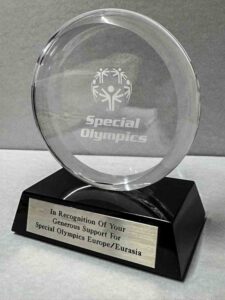
It was subsequently recognised with a Bronze Arrow award at the British Television Advertising Awards, the joint-highest award for a charity commercial.
The Bees United archive holds a recognition award presented to the Football Club for their support in the making of the film.
The Special Olympics were first held in Chicago in July 1968 and are distinct from the Paralympics, which focuses on participants with physical disabilities.
They are now held every 2 years, alternating with the Summer and Winter Games, with the next being hosted in Italy in March 2025.
Although the Special Olympics are recognised by the IOC (International Olympic Committee) they cannot use the 5-rings logo.
2012 London
In the late 1990s, there was much speculation about Brentford’s future ground. July 1998 saw the club announce the desire to have a new 25,000 all-seater, all-weather, multi-purpose stadium. The £50m venue would either have a sliding roof or a removable grass pitch which could be funded by lottery grants, private investors, and the sale of Griffin Park. It was mooted that the venue could host pop concerts and major sporting fixtures, including Olympic events – if Britain’s bid to host the 2012 games was successful.
From 2003, Mike Power was Chief Operating Officer (COO) for London’s successful bid for the 2012 Olympics and COO for the London Organising Committee of the Olympic Games and Paralympic Games (LOCOG). In 2008 he joined the club and ultimately the BFC board, until 2022.
 Also in 2008 Griffin Park, or a new Brentford stadium, was listed as one of the venues which could host visiting teams for training camps for London 2012. Subsequent delays to stadium plans meant this never transpired.
Also in 2008 Griffin Park, or a new Brentford stadium, was listed as one of the venues which could host visiting teams for training camps for London 2012. Subsequent delays to stadium plans meant this never transpired.
In the months leading up to the London games, TfL Buses were branded in Olympic related adverts. Although just prior to their respray, it had been Brentford’s adverts on the 65 and 237 routes.
With London in full Olympic mode during July and August, no pre-season friendlies for the 2012-13 season were allowed to be held at Griffin Park, nor at any league club within a London Borough.
2016 Rio
Bees forward Lasse Vibe missed the opening three weeks of the season 2016-17 as he was captaining the Denmark football team at the Olympics, to the quarter-final stage.
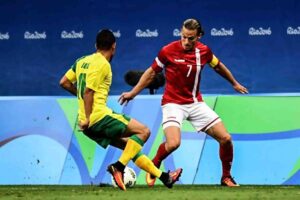 He was one of 3 overage players (29) in the Danish squad. Their group stage matches ended 0-0 (Iraq), 1-0 (South Africa) and 0-4 (Brazil), before a 0-2 defeat to Nigeria in the quarter-finals.
He was one of 3 overage players (29) in the Danish squad. Their group stage matches ended 0-0 (Iraq), 1-0 (South Africa) and 0-4 (Brazil), before a 0-2 defeat to Nigeria in the quarter-finals.
Lasse played every game but didn’t score their only goal. He did however manage to score 1 goal while gaining 11 full international caps.
The Rio games also saw Fiji beat Great Britain to claim the Gold Medal in the Men’s Rugby Sevens – the first Olympic medal ever won by the country. Fiji were coached by Ben Ryan and to mark the success, the winning team, including Ben, were depicted on the reverse of a Fiji $7 note.
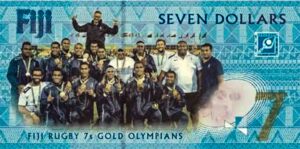
Ben joined Brentford in 2022 as Performance Director.
Even though he stood down as Fiji’s coach in 2016, he is still well regarded the country where he has been awarded the Companion of the Order of Fiji, given three acres of land and made a chief with the Fijian name Ratu Peni Rayani Latianara. He also helped changed the landscape of women’s rugby in Fiji during his time in the country. Although after his tenure ended, the groundwork bore fruit when, like the men’s side, the Fiji women’s side went onto to win a Rugby Sevens medal at the 2020 Olympics. They also beat GB, this time in the Bronze Medal match, 21-12. The popularity of the women’s game in Fiji continues to grow.
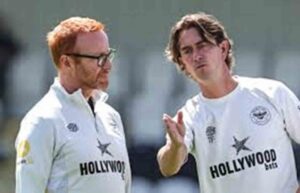
Ben is not just a well-qualified member of Thomas Frank’s coaching team, he is a true Bee.
He grew up with a mile of Griffin Park, he’s a supporter and former season ticket holder.
2020 Tokyo
At the last games (actually held in 2021), Spain achieved the Silver Medal in the football.
 Their team included goalkeeper Álvaro Fernández.
Their team included goalkeeper Álvaro Fernández.
Alvaro went onto play 12 times for the Bees in the club’s first Premier League season 2021-22, whilst on loan.
He joined Brentford just 10 days after the final, which Spain lost 5-2 to Brazil (aet), although he remained as an unused substitute in the 6 games Spain played in Tokyo.
He continues to play for SD Huesca in the Spanish second tier and has now made 100 appearances for them.
And finally……..
2024 Paris
The opening ceremony saw the competing nations travelling along the capital city’s river in a flotilla of 85 boats, with the Eiffel Tower in the background.
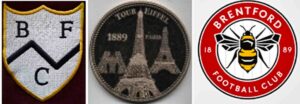 Brentford FC were, of course, founded by members of the (breakaway) Brentford Rowing Club, who used their capital city’s river for their boats.
Brentford FC were, of course, founded by members of the (breakaway) Brentford Rowing Club, who used their capital city’s river for their boats.
Brentford FC and the Eiffel Tower also share the fact that they both “opened” in 1889.
 Jonathan Burchill
Jonathan Burchill
July 2024
